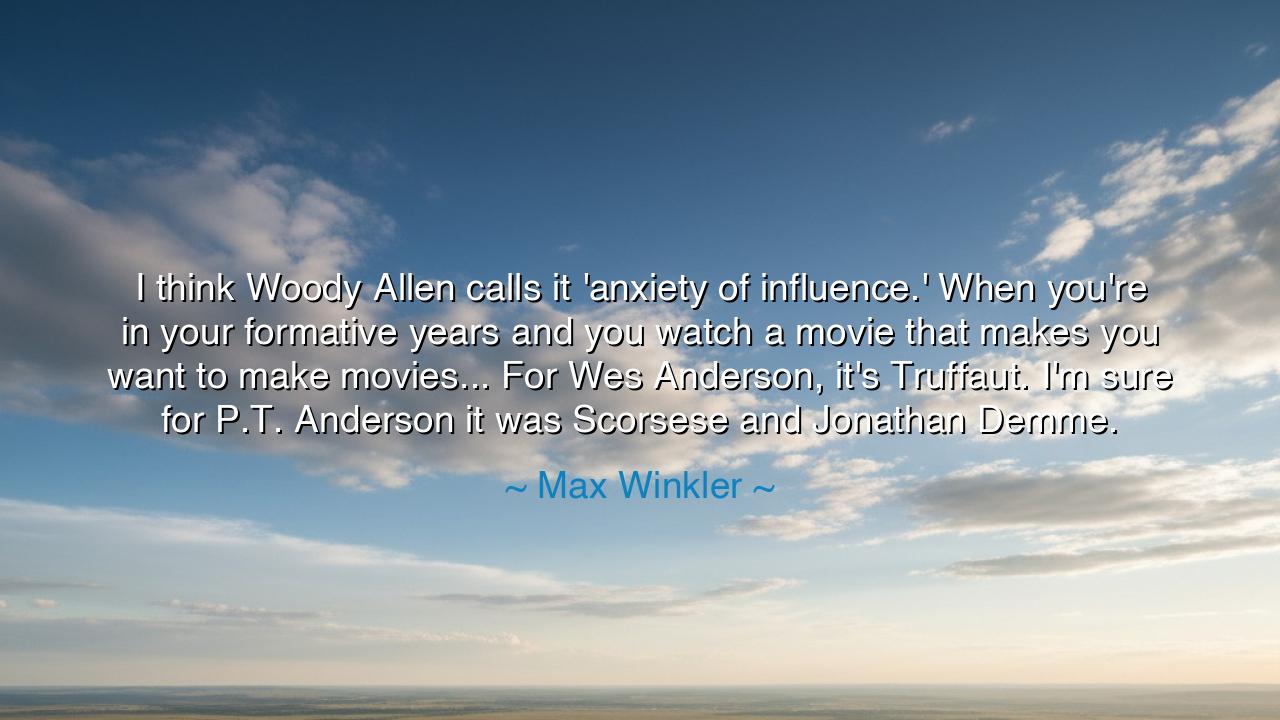
I think Woody Allen calls it 'anxiety of influence.' When you're
I think Woody Allen calls it 'anxiety of influence.' When you're in your formative years and you watch a movie that makes you want to make movies... For Wes Anderson, it's Truffaut. I'm sure for P.T. Anderson it was Scorsese and Jonathan Demme.






In the great circle of creation, there comes a moment in every artist’s life—a moment of awakening, when the spark of inspiration is kindled by a force outside oneself. Max Winkler, in his reflection on the work of filmmakers, speaks to this pivotal moment: "I think Woody Allen calls it 'anxiety of influence.' When you're in your formative years and you watch a movie that makes you want to make movies... For Wes Anderson, it's Truffaut. I'm sure for P.T. Anderson it was Scorsese and **Jonathan Demme." This moment, this anxiety of influence, is not just the recognition of artistic mastery, but the stirring of something deep within the soul, a call to create, to add one’s voice to the tapestry of art. It is a humble acknowledgment that we are shaped not only by our own experiences, but by the masters who came before us.
In the ancient world, there was no greater honor than to be influenced by the great teachers of one's craft. The Greek philosophers were known to study the great minds before them, such as Socrates learning from Anaxagoras and Plato, who followed in the footsteps of Socrates. They did not merely learn; they revered those who had illuminated the path before them. The same is true for the artists, the warriors, and the leaders of the ancient world—they were shaped by the wisdom and deeds of those who had come before them. To be influenced by a greater mind was to recognize the legacy that you were part of, and to honor it by building upon it.
Max Winkler’s words reveal an ancient truth: that the act of creating is an act of continuity, a way of participating in the larger story of human expression. Woody Allen’s "anxiety of influence" speaks not just to the fear of being overshadowed by the giants of the past, but to the great reverence that artists have for those who paved the way. Whether it’s Truffaut for Wes Anderson or Scorsese for P.T. Anderson, these influences are the guiding stars that shape their creative visions. Just as the great philosophers and poets of old looked to their elders for wisdom, so too do modern creators look to those who have come before them, seeking to carry the flame forward, to illuminate new paths while honoring the old.
The anxiety of influence is not, as it might first appear, a negative force. Rather, it is a sign of respect, of the understanding that no great creation is born in a vacuum. Truffaut, with his deep humanism and cinematic style, shaped Anderson’s unique visual world. Scorsese’s influence on P.T. Anderson speaks to a shared understanding of the power of character and storytelling. These directors, though original in their craft, were guided and shaped by the wisdom of those who had explored the same waters before them. In this, there is a powerful lesson: the greatest creators do not fear their influences, but embrace them as part of a larger continuum of creativity, knowing that their voices are but a small thread in the vast tapestry of human expression.
Think of the great warriors of old, who learned from their ancestors’ battles. Alexander the Great, though a conqueror in his own right, revered the strategies of his father, King Philip II. He studied the great generals who came before him, not to imitate them, but to learn from their victories and failures, and to carry those lessons forward in his own campaigns. Just as Alexander stood on the shoulders of giants, so too do artists like Wes Anderson and P.T. Anderson stand upon the work of the directors who shaped them. They do not simply imitate, but transform those influences, weaving them into their own unique expressions.
The lesson we must draw from Winkler’s words is this: do not fear the greatness of those who have come before you. Embrace their influence. Like the great ancient philosophers who were not afraid to stand on the shoulders of their teachers, so too must you learn from the masters of your craft, whether in art, business, or life. Be humble enough to acknowledge the legacies that shape you, but bold enough to create something new, something that will one day inspire the next generation. The anxiety of influence is not a burden to bear, but a gift, for it connects us all in the great human endeavor of creation.
So, walk with the understanding that you are part of a larger story—one that stretches back through the ages and forward into the future. Honor those who have influenced you, but do not shy away from the legacy you will leave. Let your creativity flow from the wisdom of the past, and may you, like the ancient heroes and thinkers, leave a mark upon the world that will inspire those who come after you. The path of creation is long, and though we are not the first to walk it, we can honor those who came before by forging our own unique journey.






AAdministratorAdministrator
Welcome, honored guests. Please leave a comment, we will respond soon